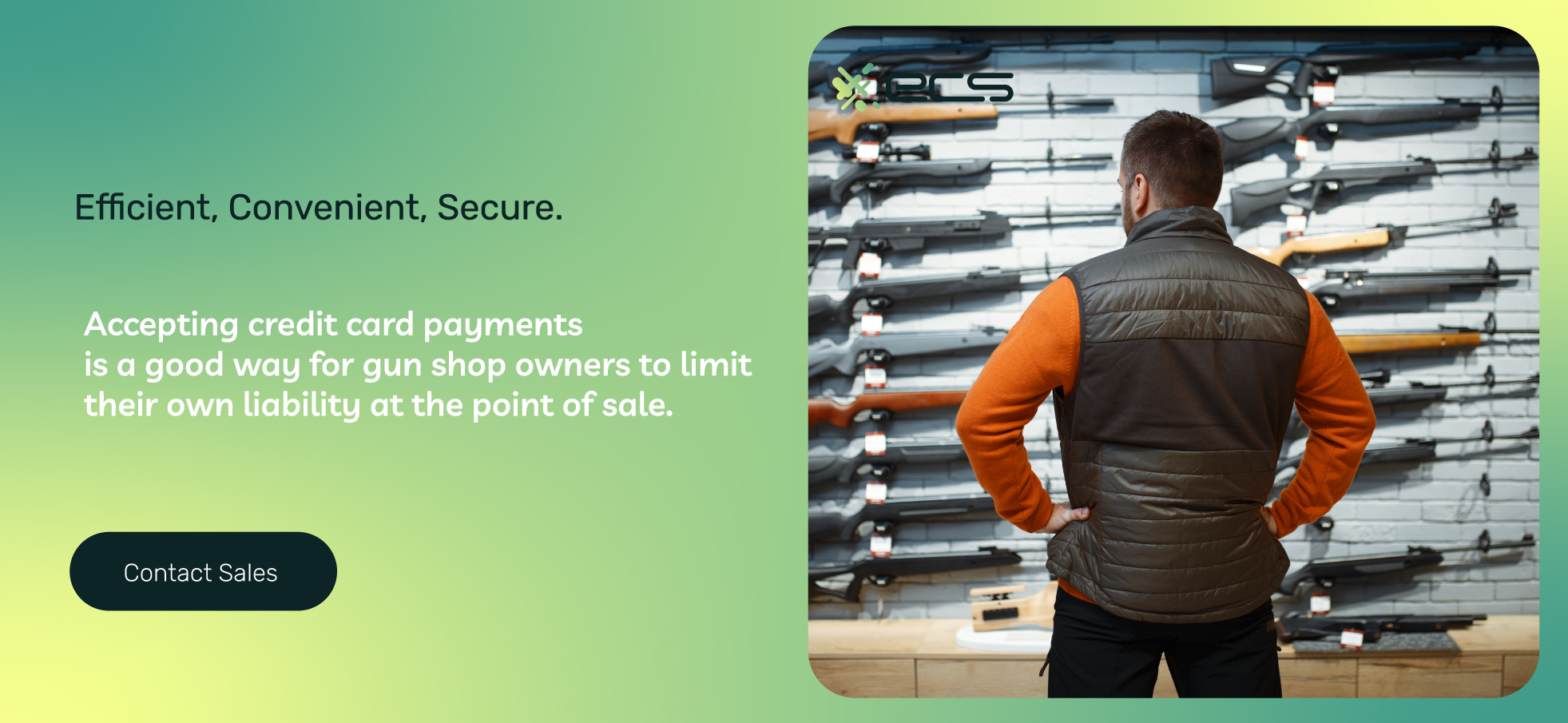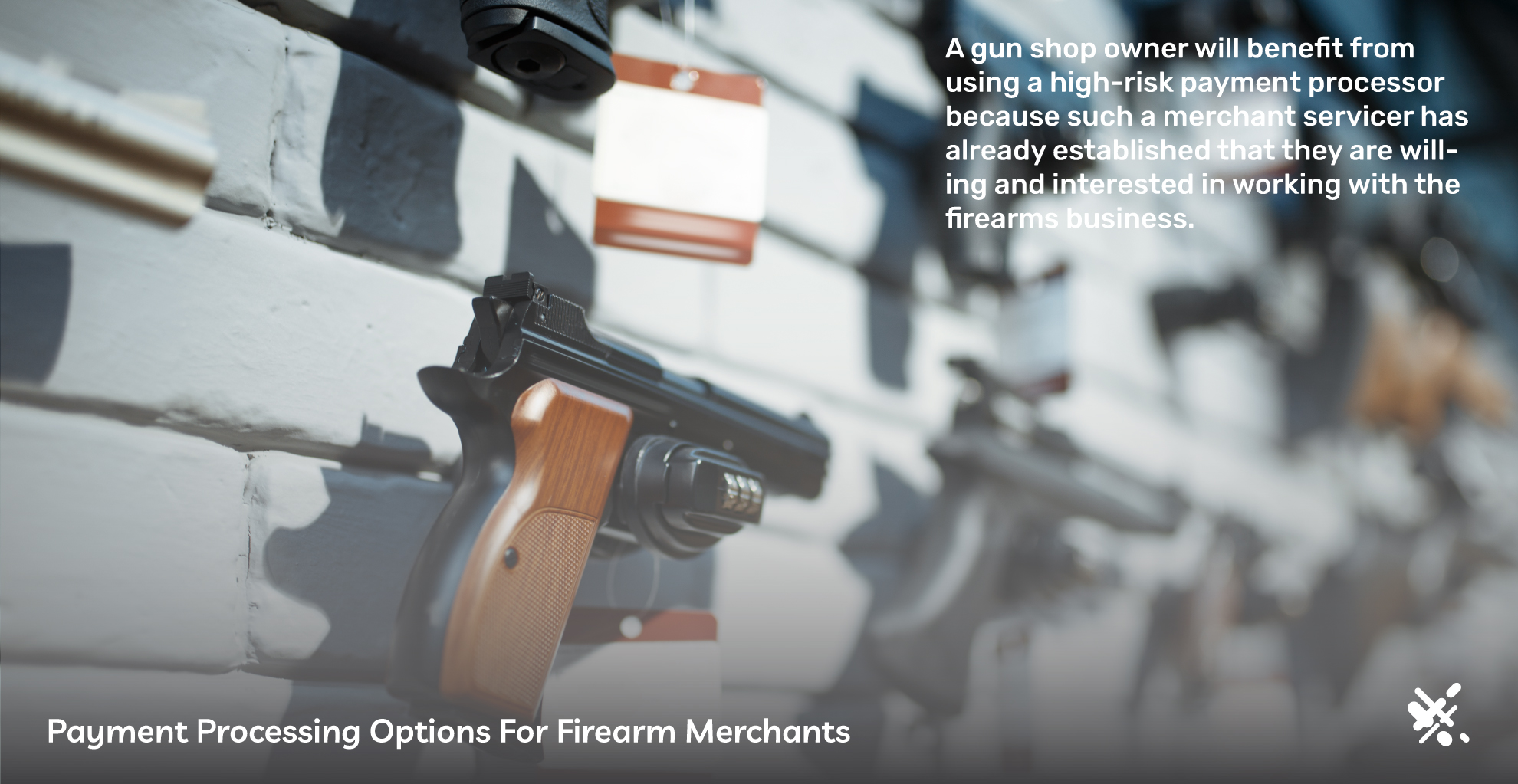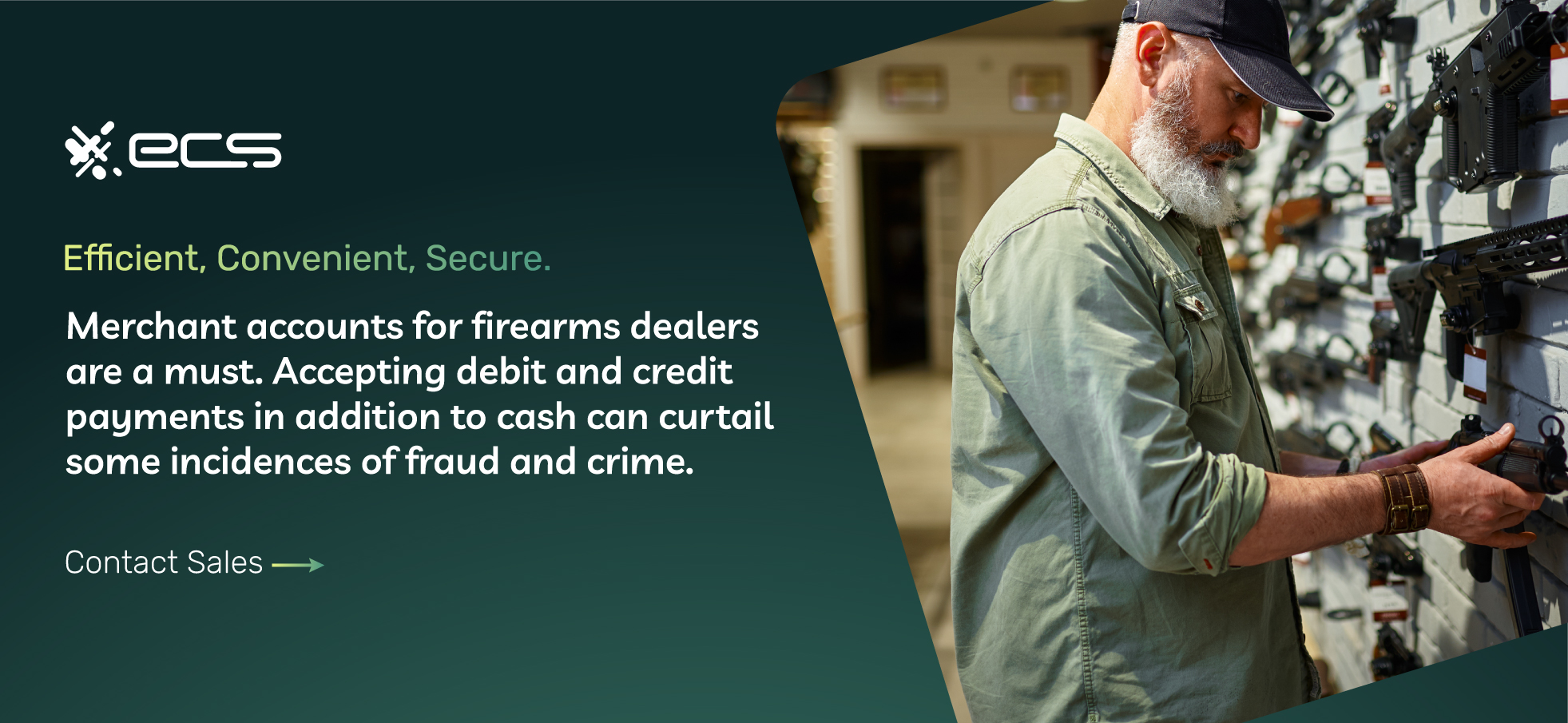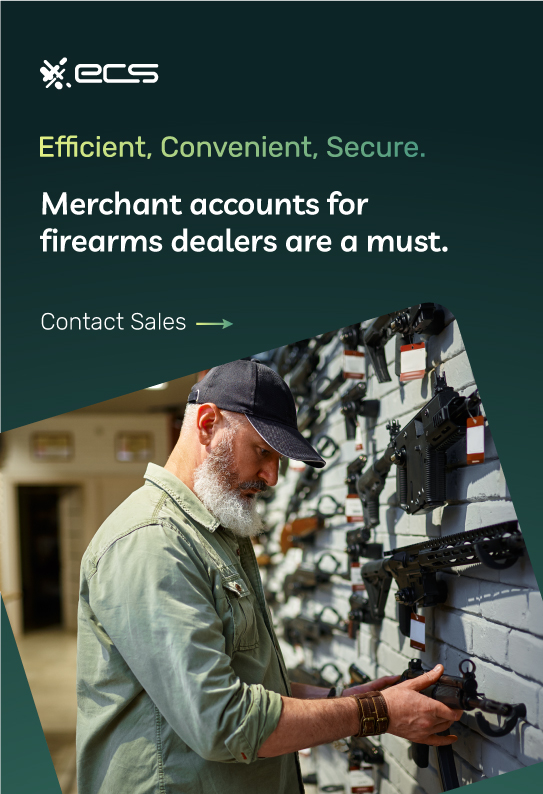With one of the most polarizing topics in America today being gun ownership, it is no surprise that a gun merchant may be experiencing kickbacks when it comes to their sales and payment processing.
But whatever people think of it, the right to bear arms is a fundamental right of the people. Guaranteed by the Constitution’s very own Bill of Rights. And statistics show that gun ownership is ingrained in the fabric of American culture. As of 2022, around 45% of American households owned at least one firearm.
As you might imagine, the demographics of gun ownership are very telling about underlying social factors. In rural areas, 46% of those polled are gun owners. While that number drops to 28% in the suburbs. And 19% in urban areas.
Registered Republicans are twice as likely to own a gun as registered Democrats. And men have heretofore been more likely to own guns than women. But, to many a surprise, the fastest-growing gun-owning demographic is actually liberal-leaning women. I know. Even we’re shocked about that statistic.
Firearm Sales Carry Risks
No matter who you’re selling guns to, there are legal and procedural considerations that relate to their sale. Some of these considerations impact how a business selling firearms can collect payments.
As anyone can intuit, selling firearms carries some inherent risk. In part due to what customers can do with the product. As we’ll see, these risks can impact the ease with which a gun shop owner can find firearms-friendly payment processing.
Criminal Activity
The first risk is criminal activity. Handguns are particularly susceptible to this risk. A four-year study tracing handguns used in crimes back to their gun stores of origin found that around 65% of handguns used in a specific crime could be traced to a retailed handgun. Interestingly, the upshot of this study is that 35% could not be traced to a retailer, which is itself a significant number.
Accidental Shootings
Another risk is unintentional firearm shootings. One study found that across all age groups, the most common contributors to these unfortunate events were playing with a gun (28%), not realizing it was loaded (17%), and hunting (14%).
Moreover, nearly 25% of the casualties had consumed alcohol before the accident. And finally, only around 2% of such accidents resulted in a fatality. Overall, the number of accidental firearm deaths is very low: around 500 per year.
Gun-Assisted Suicide
Another risk is suicide. Firearms are used in about 50% of suicide deaths, and around 60% of all gun-related deaths are suicides. Suicide by firearms is deadly and effective, with 90% of them resulting in death. Studies have shown that gun-related suicides are slightly higher in states with fewer restrictions on gun ownership. But even these studies acknowledge that other factors may be at work.
Mass Shootings
One form of gun violence garnering the most media attention is mass shootings, particularly in schools. Sometimes these shootings involve minors who obtain their weapons from a willing or (un)willing adult.
But certainly, other factors must be considered here as well. Especially since studies have shown that almost 95% of school shootings occur in public schools, where mental health considerations may get swept under the rug in the shuffle.
To all of these concerns, there are adequate rejoinders. According to the FBI, a gun is stolen from a car every 15 minutes. And while the savants over at the Public Broadcasting Network have attempted to portray otherwise, law enforcement publications such as Behind the Badge have confirmed that less than 2% of polled inmates said they had secured their gun from a retail source.
While there is certainly room to assume that some inmates don’t want (for whatever reason) to say where they secured their firearm, 2% is a low threshold, implying that potentially up to 98% of criminals stole their firearm.
Positive Stats About Firearm Ownership
Guns arguably prevent 2.5 million crimes every year, which translates to about 6,900 crimes per day. Returning to the idea of polling the incarcerated, 60% of them said a gun deterred or would deter them from committing a crime. And in the wake of Sandy Hook, an Obama-era study by the CDC found that the presence of a gun prevented perhaps as many as 3 million crimes per year.
If you disagreed with the premise that responsible gun ownership saves lives, you probably wouldn’t be in the business of selling them or conducting any kind of ancillary business such as running a shooting range.
And while many adversarial voices to gun ownership link them to hunting and self-defense, historians are well aware that the Second Amendment is the ultimate check on government overreach, as fundamental to the nature of America as the First Amendment, in terms of securing liberty.
Payment Processors May Not Agree With You
Unfortunately, payment gateways that help their merchant accounts accept payments do not show an interest in the philosophical speculations of the firearms industry. Nor do they have an interest in the many, proven, positive aspects of gun ownership. The fact is that even beyond the slant of an increasingly anti-gun media, tragedies involve firearms, far more so than other types of goods.
Thankfully, there are gun-friendly credit card processors who can provide credit card processing to firearms-related businesses. However, this type of merchant service will be different from the likes of which is provided by PayPal, Square, or Shopify Merchant Services (which is actually Square wearing one of those tacky Groucho Marx disguises). Firearm credit card processing will need to work with a high-risk payment processor to accept credit or debit cards.
Why You Need a Payment Processor
There is no reason why a gun owner can’t buy their firearm with cash. However, accepting credit card payments is a good way for gun shop owners to limit their own liability at the point of sale. As much as a background check. As everyone knows, cash is untraceable and much easier to use as a means of funding criminal activity. Or obscuring criminal sources of their money.
It is possible for someone to pass a background check and use the firearm you sell to them for something criminal. Even if their record was clean. They could also sell the firearm on a secondary or black market. Although the stats we cited earlier make it clear that stolen firearms are mainly responsible for criminal activity, cash sales can still provide a backdoor for future criminal activity.
Other Pros and Cons of Cash
Cash can also endanger your business from a different angle, and that is attracting criminal activity. You might find it ironic or even possible to conceive that criminals would attempt to rob a gun store. But such activity may occur after hours.
Having substantial amounts of cash on hand can be an invitation for criminals to try their hand at a robbery. If they do not find cash, they can make off with firearms that they can then turn into cash with illegal sales.
Of course, you don’t want to rule cash out, as some customers will just want to pay with it anyway. But firearms-related businesses can eliminate a significant amount of risk in terms of limiting their liability (through the involvement of criminal activity or attracting criminal activity) by taking credit and debit card payments. And that of course, necessitates some firearm payment processing.
But as mentioned, that is probably going to be a high-risk merchant payment processor. High-risk payment processing is (as its name sounds) payment processing for businesses that are high-risk—like firearm sales.

What is High-Risk Payment Processing?
High-risk payment processors are servicing merchant accounts that are either risky themselves or participants in a high-risk industry. In regards to the first consideration, a business may be a high risk if it experiences a high number of chargebacks.
This ratio among card networks is generally 1% of their sales volume and/or 100 chargebacks per month. A business could be in a low-risk industry, but experiencing a high number of chargebacks due to poor management.
Then, of course, there is the industry itself. If an industry as a whole experiences a high number of chargebacks, even a responsibly run business in that industry will be viewed as a high risk. An example of this is the travel industry.
There is nothing inherently dangerous about travel booking and it’s not any more of a crime nexus than other cyclical industries. But high chargebacks do tend to occur with these types of merchants.
Fraud and Friendly Fraud
Fraud is also a concern in certain industries. For instance, in terms of firearm sales, customers may use stolen data to pay for or impersonate someone who can purchase a firearm.
There is also a subset of fraud. This is friendly fraud. In recent years, the travel industry (which, yes, is unrelated to firearms, but bear with us) has seen an increase in friendly fraud. Consumers will book a flight, hotel, or vacation package, follow through on their travel arrangements, and then claim that they never happened.
Friendly fraud is actually up as much as 30% in all retail sectors in global markets around the world. But in industries like travel, where the average ticket is much higher (hundreds of thousands of dollars), friendly fraud can be devastating to merchants and the companies who are involved in processing their payments.
Legal Considerations
Then, there are legal considerations. Industries like gambling, alcohol, and adult entertainment have minimum age thresholds for these activities. And there is a complex legal landscape across the United States, whereby some places permit these activities. And in others, they do not (and a whole spectrum in between).
These legal issues can create potential risks and complications for payment processors. And the nuance of permissibility from state to state can also complicate facilitating payments.
Industries on the cusp of legality or newly minted industries are also problematic. A few big examples of that are marijuana, CBD-related products, and eCigs. While studies are touting the health benefits of these substances or at least the fact that they are healthier than similar activities, these studies have not borne the test of time in terms of showing how safe they really are.
Complications from unperceived side effects may one day arise. Creating a cascade of class action lawsuits that financial institutions would prefer not to be embroiled in.
Why Cookie-Cutter Options Won’t Work
Merchants in these industries could have a more difficult time getting a payment processor. Cookie-cutter one-size-fits-all options will not work with them at all. That’s because if they are looking into the more common companies like PayPal and Square, they are actually looking at a specific type of payment processor called a payment aggregator.
Aggregators bundle all their merchant customers under their own merchant ID for the purpose of representing them and facilitating their transactions in the payment landscape.
Of course, PaPal does not want to risk making waves with its own partners in the payment landscape. If a PayPal merchant starts showing any sign of trouble, PayPal can freeze their account or drop them entirely, sight unseen. And there are many industries PayPal won’t service, to begin with—like the firearms industry. The same is true for Square, one of the most popular payment processors among merchants.
As such, a merchant in any of these so-called high-risk industries can have trouble finding a payment processor. When they begin to look through the options of high-risk payment processors, they may be off-put by some of the higher fees and perhaps rotating reserved requirements (more on that later). Some payment processors posit themselves as if they’re doing you a favor…even though they’re collecting higher fees.
How All This Relates to Gun Sales
All of this relates very much to the firearms business. Reviewing some of the traits of high-risk industries, we see that they are perhaps (1) rife with chargebacks, (2) subject to more fraud than usual, (3) present legal issues, and (4) may be on the cusp of legality or normative activity.
All of these concerns can impact gun sales. For instance, in terms of legal issues, different states have different gun laws. And in terms of being on the cusp of legality, there is an ever-shifting legal landscape around gun ownership. Which takes away some consistency in terms of expectations around the market outlook.
Additional Industry Culture Considerations That May Prove Problematic
One last consideration bears mention here, perhaps introducing the topic with some light treading over turf that can certainly yield some discussion about the interstice between culture and economics.
Tech companies as a whole lean left. Not literally, but politically. While this may sound like a gross overgeneralization, one tangible way of tracking this information is by employee contributions to political parties.
Around 98% of the political contributions coming from Netflix go to Democratic campaigns, making it the most liberal of tech companies (by this metric). Followed by Nvidia and Adobe (each 93%), IBM (90%), Salesforce (89%), Google (88%), and a few spots down the line, PayPal (84%).
Now on to banks. While the banking industry overall contributed slightly more to Republican campaigns in the 2020 election, the biggest banks lean left as well in terms of employee donations. At least as indicated by the percentage that went to Democratic campaigns: Wells Fargo (65%), Chase (67%), Bank of America (65%), and Citigroup (65%).
Banks and tech companies have become increasingly emboldened about asserting their political ideologies on the clients and customers they serve. They have de-platformed and unbanked individuals who have verbalized dissension with so-called mainstream talking points.
One noteworthy incident where this came to a head was the trucking convoy protest in Canada. Bank accounts, insurance policies, investments, and even business activities of anyone involved in the protest were frozen.
Is This Really a Concern in the Land of Red, White, and Blue?
Fair enough, you might say, but that’s in the land of Maple Syrup and Ice Hockey (no, not Vermont). Such practices would never occur in the land of free speech. As it turns out, Chase is in the crosshairs (forgive our metaphor) of certain senators for unbanking the religious non-profit National Committee for Religious Freedom (NCRF).
Chase refused to continue servicing the NCRF until it would furnish Chase with a list of its donors, and a list of political candidates it would support. Along with an explanation of why they would endorse said candidates. All of which seems fairly invasive given the propensity of banks to have no scruples opening fake accounts under your name to meet sales goals.
The Ugly Truth About Banking and Gun Culture
And now it’s time to bring this discussion into the bullseye—although (as mentioned) it would certainly yield some interesting spinoff conversations—by pointing out that Wells Fargo dropped the accounts of Brandon Wexler, a Florida firearms purveyor it had worked with for 25 years.
Per the terse and enigmatic jargon of B2C parlance in which banks deem to speak to their clients, the reason provided was: “We recently reviewed your account relationship and as a result of this review, we will be closing your above-referenced accounts.”
Politicians are fighting back, such as Florida Governor Ron Desantis. Who is pushing for legislation that would regulate and prevent banks from pursuing such discrimination. DeSantis invited Wexler to address the crowd. He encapsulated the frustration of having your financial backend suddenly pulled out from under you. “If you can’t transact with a business, you don’t have a business.”
Card networks like Visa, Mastercard, and Discover were also intending to move forward with a plan to categorize gun stores with a specific Merchant Category Code (MCC) that is different from sporting goods stores. The thought being that such MCC would help track down criminal activity.
The push for this change came from Amalgamated Bank out of New York. But as soon as it met legislative resistance in certain states, the card networks said the implementation of such a plan carried with it an inherently high (too-high) barrier of functionality.

What Steps Can You Take Now
We could continue to spill ink over the seeming encroachment of banking and tech institutions into the decision-making domain that really should be left in the hands of small business owners and their customers.
But suffice it to say, banks, card networks, and even payment processors often lean left. Which also often includes an unfavorable outlook on gun ownership. Moreover, they have become increasingly vocal about de-platforming companies in industries (or possessive of viewpoints) they disagree with in principle.
As a gunshop or shooting range owner, this means you are going to have to look for a firearm merchant account if regular processors are not willing to process payments in the firearm industry. And as a side note, while you’re at it, you might think about where you bank with.
Regional banks (again, by tracking campaign donorship) are more likely to be sympathetic with certain causes such as the second amendment (or 2A, as it’s called by advocates). And big banks like Wells Fargo show they have no scruples about suddenly pulling the rug out from underneath their gun shop clients.
What Are the Payment Processing Options For Firearm Merchants?
Probably something much smaller than PayPal or Square and something with no aversion to servicing clients in industries that are the boogeyman to bigger companies. A gun shop owner will benefit from using a high-risk payment processor because such a merchant servicer has already established that they are willing and interested in working with the firearms business.
There is much less risk of the payment processor dropping you for no reason. It is more likely that if there are issues (like chargebacks), they will be willing to pick up the phone and discuss them to a satisfactory resolution.
What are Some of the Common Requirements and Limitations For Firearm Sales?
Most conventional sporting guns have no registration requirement from the federal government. However, the National Firearms Act (NFA) mandated that certain types of weapons or devices be registered with the ATF or Bureau of Alcohol, Tobacco, and Firearms (not necessarily enjoyed in that order). These include short-barrel shotguns, machine guns, and silencers. Owners must go through a background check, purchase a stamp tax, and register the weapon with the ATF.
Per the Brady Handgun Violence Prevention Act of 1994, this background check will deny ownership to individuals who:
- have had a prison sentence of at least one year
- are a fugitive
- are an abuser of an illegal drug
- a court has ruled mentally ill or unstable
- are illegally residing in the country
- received a dishonorable discharge from the Armed Forces
- were subject to a restraining order from a spouse or one that involves children
- have been convicted of domestic violence crimes
As you can see, the purpose of the 300 million such background checks to have been initiated since the passage of this act is to weed out any individuals who would make risky gun owners—e.g. those who have already committed criminal activity, have the motivation to engage in such activity, or are mentally unwell.
You might think that such restrictions are more than enough. But the particulars of gun ownership have mostly devolved to the state level. There are a number of criteria for determining which states are more gun-friendly than others.
But some of them include the quantity and impact of gun laws, the number of individuals employed in the firearm industry, and resident sentiment about gun ownership. Without delving into too nuanced an assessment, states in the South, Midwest, and Southwest dominate the list.
States With So-Called Loose Gun Control
In Arizona for instance, you do not need to obtain a permit to buy a rifle or handgun. Nor do you need to register them. You can also carry a concealed handgun without a permit. Alaska has similar laws, combined with a very active hunting culture.
Vermont is an odd one among the East Coast States. It’s politically “blue” but it ranks as the second best place to own firearms according to industry publication Guns & Ammo. The minimum purchasing age for certain guns is 16 and there are no restrictions against bringing guns into houses of worship, bars, and voting locations. In Kansas, government employees may carry concealed, as can university students. There is also a prohibition on gun buyback programs.
States With Strict Gun Control
On the other end of the spectrum, California requires micro-stamping for all new guns for tracing purposes. Hawaii is one of five states limiting gun ownership to those 21 and older. New York was the first state in the country to adopt liability laws that could hold gun manufacturers liable for death and injury. In Massachusetts, gun owners must keep guns under lock if they are not in their immediate control.
It’s worth mentioning that the states lauded by gun-control advocates—New York, California, Illinois, and Maryland—are home to urban enclaves that have some of the worst crime rates in the entire nation.
For example, looking at total homicides, chart-toppers include Chicago (697), New York City (438), Los Angeles (382), and Baltimore (335). With numbers like this, it seems likely that someone in one of these cities will start wearing black spandex and a bat mask, as they take the law into their own hands if gun control doesn’t work like it’s supposed to.
Again, the reason for this disparity is likely the fact that retail merchants such as yourself are not the prime contributors to armed crime. Gun theft, not lawful sales, is what facilitates the vast majority of armed crime. Unfortunately, the landscape of payment processing and financial institutions, in general, are tone-deaf to this argument.


How Will High-Risk Payment Processing Differ From Normal Payment Processing?
A high-risk payment processor may charge higher interchange fees to compensate for some of the inherent industry risks. You will have to discuss the exact rates with the payment processors. But you may be surprised to find that sometimes these rates could be lower than what a standard payment processor would charge you. Especially if they offer flat-rate or even tiered pricing structures.
As mentioned, a high-risk payment processor may also require the merchant to keep a certain amount of cash on hand with the payment processor as a rolling reserve. This rolling reserve is there to cover the cost of any chargebacks the processor might incur, rather than requesting the merchant to pay them as they come up. As its name suggests, merchants receive portions of the reserve if a certain period of time elapses without chargebacks.
A high-risk payment processor will also likely be more responsive on the customer service end than a bigger payment aggregator. It is already understood that this arrangement requires a little more cooperation and teamwork than usual, given the potential issues that could come up in the payment history.
A high-risk payment processor will (or at least should be) responsive and agile in dealing with issues as they come up. For example, they may assign a specific account manager to a merchant as a point person for communicating any and resolving issues, rather than a monolithic, many-chambered customer service hotline.
Compliance, Security, and Anti-Fraud
A high-risk payment processor will also be familiar with compliance and security concerns in the particular industries they serve. In this case, those servicing a gun shop merchant account will know about the various restrictions and requirements around gun sales in different states. Therefore, they will responsively arrange the payment process on the backend to meet these needs.
For example, since a background check may be part of certain gun purchases, they may have options for holding money in escrow until the check is completed and the sale is authorized. Something that many standard payment processors cannot do since there is generally no need for escrow accounts.
A high-risk payment processor is also equipped to deal with fraudulent transactions. They have policies and procedures that facilitate secure payments. Gun shop merchants will need to do some of this themselves as a front line of defense. Such as requesting photo ID and matching signatures. But a good payment processor, especially in high-risk sectors, has taken appropriate steps in terms of software and hardware to minimize the proclivity for fraud.

The Best Payment Solution For Firearm Sales
Merchant accounts for firearms dealers are a must. Accepting debit and credit payments in addition to (or instead of) cash can curtail some incidences of fraud and crime. But high-risk payment processors need to service gun shop merchant accounts. Because the industry as a whole presents certain risks. Although the extent of those risks, as weighed against their merits, is hotly debated.
Although there may be higher transaction fees and the requirement for a rolling reserve, payment processing for firearms from a high-risk processor will likely be more attentive and proactive than that provided by a larger, more monolithic option. Moreover, since many regular payment processors won’t work with firearms businesses anyway, a high-risk merchant account may be the only solution.
To contact sales, click HERE. And to learn more about ECS Firearm Payment Processing visit High-Risk.
